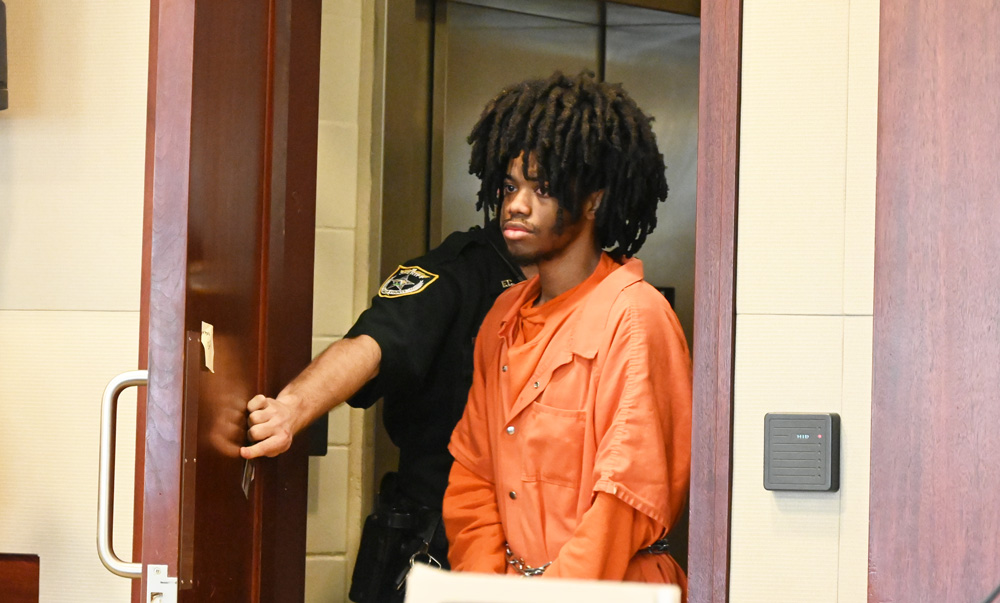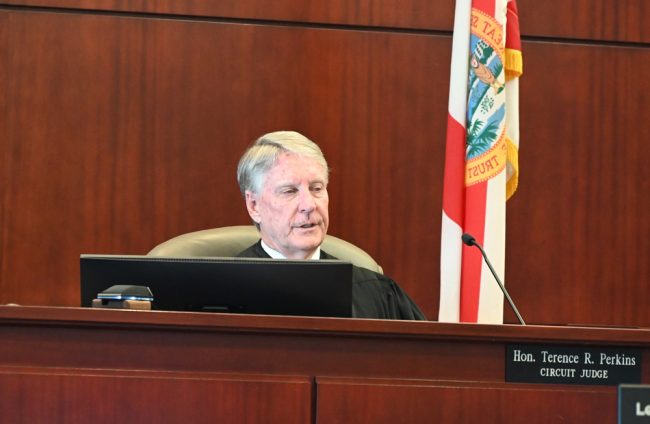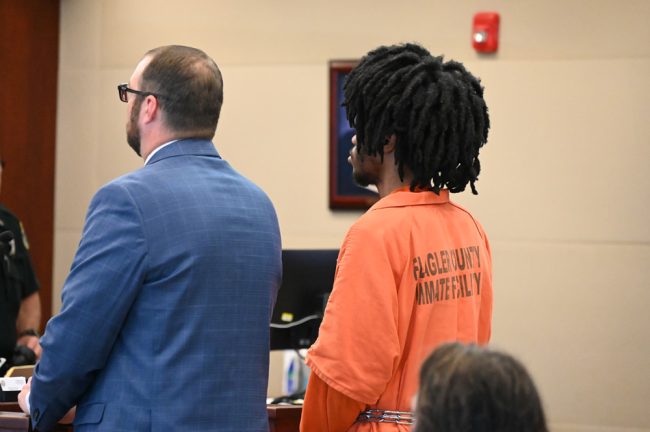
It took a lot of work on Circuit Judge Terence Perkins’s part this morning. But in the end, the judge convinced Ja’vere Justin Lumpkins, who just turned 22, to take the deal: six years in prison, instead of a high likelihood of life in prison if he was convicted at a trial that was set for next month.
Lumpkins was brought into Perkins’s courtroom this morning, after 509 days at the Flagler County jail, intent on rejecting plea offers. He wanted to go to trial. He faced several counts of sexually assaulting two of his half-sisters, which alone could send him to prison for life. The minimum sentence he’d face on conviction would have been 21 years in prison.
That’s assuming the state didn’t bring forth additional charges involving two additional siblings, as it very well could, as even Spencer O’Neal, Lumpkins’s defense attorney, cautioned.
Assistant State Attorney Melissa Clark was willing to offer Lumpkins six years in prison followed by nine years on sex-offender probation, with a designation as a sex offender–exactly the same terms she offered Lumpkins’s brother, Marcian Omar Thompson, last June. Thompson, now 19, had sexually assaulted some of the same siblings. Both brothers had repeatedly done so over many years while they were in their mid-teens, and the girls were from 6 to 14 years old.
Lumpkins wasn’t interested, even though it was clear his attorney was advising him to take the deal. It was a bewildering moment, knowing how much evidence the state had amassed against Lumpkins, including confessions.

There’s no lack of admiration for Perkins in the Seventh Judicial Circuit, but that admiration is often abstract and generic. Today’s hearing was a tangible example of his juridical and rhetorical mastery in serving both sides’ interests while addressing a seemingly unyielding defendant on the defendant’s terms, respectfully, without condescension or impatience, and winning him over. The hearing will soon be forgotten as one of thousands conducted by the judge every year. But it could be taught in law school as an example of judicial temperament and skill, and the art of resolution: it’s no small matter that the plea avoids a weeklong trial whose outcome was all but foretold, and where child victims–who have been suffering depression, instances of self-harm and other psychological fallout–will have had to testify about lurid traumas they endured at Lumpkins’s hands.
This morning’s hearing wasn’t to discuss a plea. It was for Perkins to hear several pre-trial motions typical in such cases, when trial parameters are set, including what witnesses, among them the victims, may or may not say, what they may and may not be asked, whether the hearsay testimony of witnesses, two of whom are siblings who also allege that they’d been molested, would be admissible.
Some of the siblings were to testify today. In sex-abuse cases involving children, Clark’s goal is to avoid having children testify, since that re0-traumatizes them by making them verbalize the experience again–in open court, in front of strangers, in front of their abuser, and in a setting that can turn adversarial, once the defense gets to cross-examine the witness. So for Clark, once children testify in a pre-trial setting, it’s crossing a red line: all deals are off the table. The children this morning were set to testify.
“Obviously, if we go through this hearing today, we’re starting that process and so there’s going to be no more negotiations and it’ll be up to the jury to decide,” Clark told the court as she sat across from Lumpkins. “As the defendants is aware, he was interviewed by the police and he did make some admissions for some of these allegations. The jury is going to hear that as well as the testimony of not just the primary victims, but assuming the court finds that the testimony of witnesses is relevant, they would hear from those siblings as well.”
Clark had little doubt that, based on case law and Perkins’s prior rulings in similar cases, she would prevail today in pre-trial motions, stacking the deck against Lumpkins.
“I spoke with Mr. Lumpkins about that,” O’Neal told the judge, “so we’re sorry to indicated that he still did not want to accept the offer. He knows what the risks are.” He also knew that there’d be more charges, and that “things can get significantly worse.”
Then it was Perkins’s time to address Lumpkins as Lumpkins stood shackled a few feet from him. What followed was a display of Perkins’s exceptional skills at high-pressure persuasion made to sound as conversational as a fireside chat. The only thing missing was a fireside. Speaking gently but with clarity to a young man whose refusals to accept the deal bore the self-certain tone of an adolescent against the world, Perkins repeatedly impressed on Lumpkin the gravity of his possible fate at trial, and the relative forbearance of the plea offer.
Perkins did so by first acknowledging Lumpkins as a human beings and addressing him person to person, almost in a fatherly rather than a judicial tone, on Lumpkins’s terms: “This is a difficult discussion. It’s made particularly difficult because you’re a young man,” Perkins told Lumpkins. “It’s also particularly difficult because no one wants to think about going to prison. And this is a prison offer. It’s not near what the prison requirements would be if you were convicted, but it’s still prison. And I understand that. It’s not only difficult to kind of wrap your mind around. It’s difficult to even talk about. But now is the time to talk about it.”
Perkins explained that the offer was ticking down to the moment when witnesses and victims would testify, moments from now. He explained how significantly lower it was than the sentencing guidelines call for. He told him how others in his shoes have ended up with life terms, how it was in his (Lumpkins’s) control to accept an offer as he would not be able to control a jury’s decision.
“So now is unfortunately, the last real opportunity, the last opportunity at all to try to resolve this case short of going to trial and facing the conviction in that sense,” Perkins told him. He asked him if he understood the offer (Lumpkins did) and what the consequences could be if he rejected it and were convicted at trial (he did).
Lumpkins was not moving. Perkins, who has an agile, tactical mind, changed track.
“So what we’re going to have today is we’re going to have some testimony about what happened,” the judge continued. “It doesn’t help you today. There isn’t anything that’s going to happen today that helps you in moving this case forward. You were there. You know what happened. Whether they testify truthfully or not only you’re going to know, but so assuming that they testify truthfully, again, that doesn’t really move the case forward to you. The only thing that happens is, once I finish this part of our conversation, if we decide to move on, the offer is gone. All offers are gone. And there’s nothing I can do about that. You understand that part, too?”
“Yes, your honor.
“So this is kind of in your hands and with Mr. O’Neill’s,” Perkins said. “So we can move forward. But that only benefits the state moving forward. That allows them to introduce evidence that otherwise they may not introduce or may not be allowed to bring in. So it’s only a downside for you.”
Lumpkins was not moving.

The judge asked what would have been on any baffled mind to ask: “What stuff from your perspective, what’s the downside of resolving the case?”
Lumpkins said he would be spending the rest of his life branded as a sex offender, and while the prison term wasn’t a lot of time, it was a “significant amount of time.” (The six years would actually be just over four and a half years, because he has already spent 16 and a half months in jail, time that will be credited to his sentence.)
O’Neal jumped in, here speaking as if he was making the judge’s case, or speaking like the prosecutor: the current bottom of the sentencing guidelines call for 21 years in prison, he said, but that’s not what the guidelines will call for by trial’s end. “If we lose,” he said,” looking at the judge but obviously addressing Lumpkins, “21 years may not be the guide. It may be significantly higher. So the 21 year number isn’t even necessarily a real number, right? But it could be 30 or 40 years.” He added: “The state has already indicated multiple times since we’ve been through court that if we go to trial, they’re going to be filing more charges.”
O’Neal was explaining in simple terms the prosecution’s routine strategy: throw the book at a defendant, especially when a deal is rejected. Meanwhile, use the book as a Damocles sword, leveraged over the defendant’s decision. That’s what hung over Lumpkins today, with his own attorney shining a light on the sword.
Perkins echoed the caution, and brought his points to a close. “Okay. So this is it. We have a lot to do this morning,” he said. “This is our last chance.” He then showed his lifetime’s experience: Perkins knew just then that if he were to ask Lumpkins in open court whether Lumpkins had changed his mind, Lumpkins would keep his heels dug in. There was dignity to consider, and not a small measure of vanity. So Perkins gave the deal one more chance by giving Lumpkins a way to save face.
“So what I want to do is, I want to give you a chance to talk to Mr. O’Neill one last time about all of this, understanding it’s your decision to make,” Perkins told Lumpkins. “I want you to talk to him in private. Mr. O’Neal, take as much time as you want. When you’re ready to go, let us know, we’ll come back.”
They would talk outside the courtroom, in the holding cell nearby: another bit of tactical sagacity, allowing Lumpkins to be freely emotional in private, as he ended up being: when he was back in court later, he was crying.
But he had moved.
When Lumpkins returned, O’Neal told the court he was accepting the deal.
This post was originally published on this site be sure to check out more of their content.







